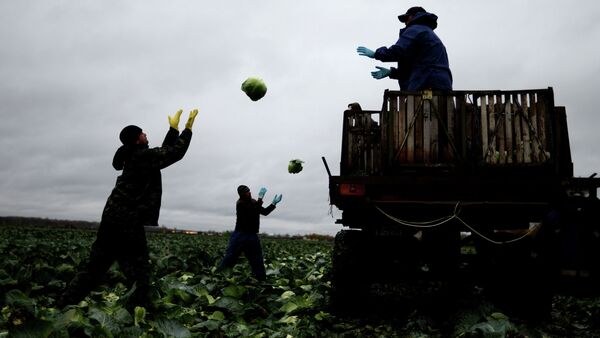According to Eurostat, Russia used to be the second-biggest market for European farming exports, after the United States. Russia imported some $40-billion worth of agricultural products, and sanctions introduced by Russian authorities have affected about 10 percent of agricultural exports.
By no means unimportant is the question of sentiment of Russian manufacturers. We’ve had a chance to ask them directly.
“The attention of media was directed on our production of milk, potatoes and vegetables, and everyone started to speak about us as a really important example of a 100-perecnt national Russian producer. For sure, getting consumers’ attention means that there’ll be searching in markets, supermarkets and shops for these producers, and the retailers are now also very curious about searching new national producers… There’re many producers who have had big problems with getting into retail chains, now they have this possibility thanks to the sanctions,” said Anna Boyko-Velikaya of Moscow-based Russkoye Moloko.
“We produce different kind of products – from vegetables to cheese and wine, and the product lines that have been effected primarily are the ones that used to be imported almost exclusively from France, for example, cheese, and this product has seen very positive growth… and we’ve been able to increase actually tenfold our production volumes,” Mikhail Nikolaev, managing partner of Krasnodar-based family enterprise Nikolaev and Sons said.
On the other hand, the sanctions, which are still taking a toll on Russia’s economy, cut both ways. A number of European states have reported big losses after the Russian market was no longer open to them. The economic impact of the sanctions might be most acute in Lithuania, as Russia was the largest and most profitable market for some Lithuanian products like cheese and yogurt.
According to the European Bank for Reconstruction and Development, food exports to Russia account for 2.7 percent of Lithuania’s gross domestic product, a far greater share of the economy than in any other European Union country. One more such example is Slovakia, which recently reported that only the direct negative effects of the EU-Russia sanctions on its agricultural sector have now reached 6.2 million euro.
Russia’s agriculture industry has seen a shift from using foreign companies to local producers since the sanctions have set in. However, there is no telling how long Russian food and beverage makers will be able to rake in the extra profit. People will just have to wait to receive Russian goods they cannot get their hands on due to the political tensions between various countries.



